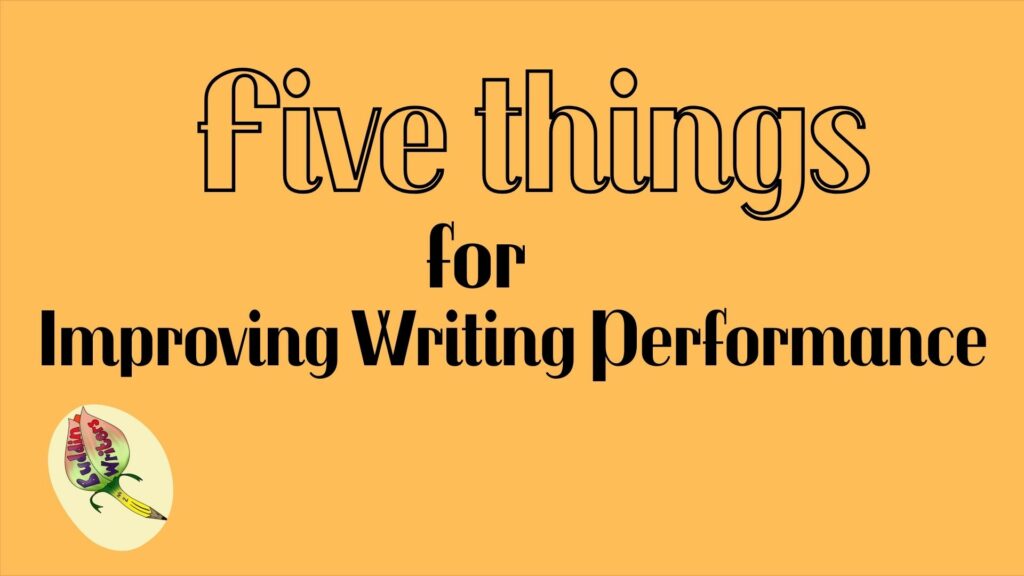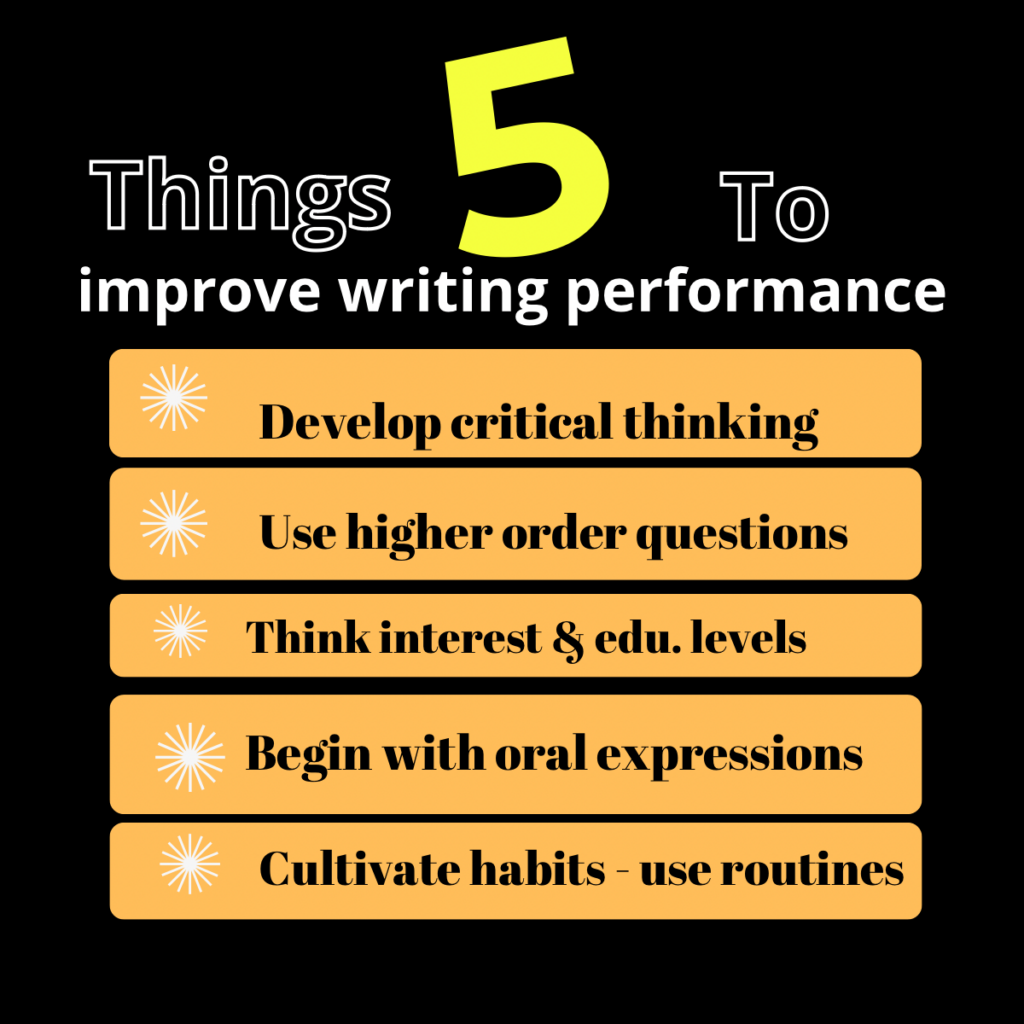by DrMarthaJay

Writing is a higher-order process. It requires a level of thinking, processing, and creating that reading does not evoke. It is no surprise that nationally half of students who read on grade level do not write on grade level (NAEP, 2023). Writing, regardless of genre or style, requires analytical skills.
Here are FIVE Things educators should consider for improving writing performance in students.
#1: Develop Critical thinking.
Critical Thinking is one of the most crucial ingredients for developing writing confidence. Critical thinking calls for thinkers to examine, evaluate, and question their thinking and the thoughts of others. They must be willing to scour through evidence without reservation and must possess the boldness and freedom to change their positions or assumptions on issues. Although in some instances, educators may have to enhance critical thinking, in early learners the skill must be developed. According to Collin Seale of Think Law, we must teach students to question assumptions, evaluate the responses of others, scrutinize evidence, agree, disagree with respect, and formulate new constructs based on the information garnered. Seale cautions educators that teaching or developing critical thinking is not another task added to their overloaded plate of things to do. Rather, it is a necessary tool that every child needs. Therefore, when educators place this at the forefront, not only are they contributing to an improvement of writing, but to effective communication in general.
# 2: Use higher-order thinking questions.
When students are taught to question the thoughts of others they are better prepared to respond to analysis, evaluative, and synthesis questions. Benjamin Bloom, in 1956, observed that cognitive maturity depended on one’s ability to reason beyond what, who, where, and when questions. Hence the development of the theory of Bloom’s taxonomy of thinking. Students who engage in the last three of Mr. Benjamin’s question stems, exhibit greater use of their cognitive ability.
As they learn to analyze information by looking for similarities, differences, outcomes, causes, and effects, they learn to identify and question weak premises and to strengthen those premises after careful analysis.
The art of responding to argumentative questions empowers students to take positions without being emotionally tied to them. Emotional detachment to ideas requires one to move beyond knowledge, faith, or even belief systems. To argue calls for an individual to look at both sides while setting aside all biases. Tough. I know because I’ve had to do that as an intercollegiate debater on a topic that did not align with my belief system. The ability to debate both sides, regardless of personal belief, is a skill that any writer needs and must hone.
In order to write well, educators must also guide students on how to scour through sources of information, extract information relevant to their topic, and write a new response. Synthesis requires high cognitive demand. Students scrutinize multiple sources to draw their conclusions or to create new assumptions.
By no means do we suggest that students should shy away from questions that focus on lower order questions like “Who” and “Where” but we reiterate that the use of higher order thinking questions provides the tools that trigger students’ thinking by causing them to challenge their perceptions, dig deeper to understand the viewpoints of others and to produce sound writing pieces that will, in turn, cultivate the same skills in readers who refuse to accept new positions of their writers.
# 3: Consider interest and educational level.
Educators must consider text selection that considers students’ interest and educational levels. As a high school language arts instructor, I realized that when I selected texts based on students’ interest, I piqued their desire to read. When I wanted students to write in response to their reading, selecting reading material on their educational level made more sense. Particularly for reluctant readers and writers. Their frustration level decreased, and their level of engagement and success increased. In essence, when educators take into consideration a reader’s interest and educational level, evidence-based writing becomes easy, and writing confidence and writing performance improve.
By considering both interest and educational level, educators can help change current statistics by improving the number of readers who will write effectively on grade level.
# 4: Engaging students in oral expression.
Educators who allow students to organize their thoughts orally, help students develop a level of confidence. Students read, think, and then orally express their responses. Oral responses provide students with opportunities to build confidence because they talk, and they reorganize their responses as they speak. Talk allows them to delete or erase without being messy.
Authors of Writing Talk, Winkler, et al. (2006), promote the practice of ‘Talk writing’ among English Language Learners and reluctant writers.
As a university instructor, I utilized the approach with students in non-matriculated writing classes and the end result was dual— students developed effective oral and written communication.
Talk for Writing is a similar approach proposed by Pie Corbett and Julia Young. It is a version of the same concept except that it focuses on helping younger writers. It allows young learners to process responses before putting them in print.
No doubt, talking to write, or talk writing enhances responses and refines writing performance. This is not to be mistaken with “write how you talk.” Talk writing provides structure and modeling that students’ emulate and practice until mastery.
# 5: The use of habits or routines
One of the final and most compelling things to consider for improving writing performance in students is the use of habits or routines.
Charles Duhhig, author of The Power of Habits (2014), and James Clear (2018), author of Atomic Habits, are authorities on the topic of habits. Both writers stress the importance of utilizing repetition of good behavior or routines to establish desired outcomes. Consistency prevents the yo-yo effect that negatively impacts program implementation, skill mastery, and success.
When students are allowed to practice, they refine their skills without the pressure of grades, they become better at the skills and improve their ability to sustain habits that lead to success.
As a former classroom teacher, I understand the value of providing students a space to practice, repeat, practice, repeat, and practice again.
Establishing routines or cultivating daily habits of writing will contribute to building writing confidence. Once students are given opportunities to hone their skills in the various writing styles, they will build confidence and develop mastery in writing.
When I developed the Writing to Respond process as an approach to writing in my Business English class, I realized that cultivating a habit of writing that was not a burden to students encouraged them to flourish as writers.
There was a marked difference in writing performance in students who had English with me for three consecutive years compared to those who were my students for the first time.
In addition to what writers on the topic of habits continue to hammer, I am confident that cultivating habits that foster frequent opportunities to write will improve students’ writing confidence and their ability to produce, even without advanced notice or in impromptu situations.
Nationally, we struggle with proficiency levels in math, reading, and writing. Maybe if we focused our attention more on developing or cultivating habits, not only in academia, but in behavior, and attitudes to learning, we might experience improvement in academic excellence across disciplines sooner than later.

Resources
Clear, James (2018) Atomic Habits
Collin Seale (2023) Think Law,
Duhigg, Charles (2014) The Power of Habit
Winkler, et al (2006) Writing Talk
AI assisted and edited by bUneke (2024)